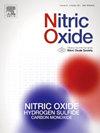Nitric oxide in the cardio-cerebrovascular system: Source, regulation and application
IF 3.2
2区 生物学
Q2 BIOCHEMISTRY & MOLECULAR BIOLOGY
引用次数: 0
Abstract
Nitric oxide (NO) plays a crucial role as a messenger or effector in the body, yet it presents a dual impact on cardio-cerebrovascular health. Under normal physiological conditions, NO exhibits vasodilatory effects, regulates blood pressure, inhibits platelet aggregation, and offers neuroprotective actions. However, in pathological situations, excessive NO production contributes to or worsens inflammation within the body. Moreover, NO may combine with reactive oxygen species (ROS), generating harmful substances that intensify physical harm. This paper succinctly reviews pertinent literature to clarify the in vivo and in vitro origins of NO, its regulatory function in the cardio-cerebrovascular system, and the advantages and disadvantages associated with NO donor drugs, NO delivery systems, and vascular stent materials for treating cardio-cerebrovascular disease. The findings provide a theoretical foundation for the application of NO in cardio-cerebrovascular diseases.
心脑血管系统中的一氧化氮:来源、调节和应用。
一氧化氮(NO)在人体内扮演着信使或效应器的重要角色,但它对心脑血管健康具有双重影响。在正常生理条件下,一氧化氮具有扩张血管、调节血压、抑制血小板聚集和保护神经的作用。然而,在病理情况下,过量的 NO 会导致或加剧体内炎症。此外,一氧化氮还可能与活性氧(ROS)结合,产生有害物质,加剧对身体的伤害。本文简明扼要地回顾了相关文献,阐明了 NO 在体内和体外的起源、在心脑血管系统中的调节功能,以及治疗心脑血管疾病的 NO 供体药物、NO 输送系统和血管支架材料的优缺点。研究结果为 NO 在心脑血管疾病中的应用提供了理论基础。
本文章由计算机程序翻译,如有差异,请以英文原文为准。
求助全文
约1分钟内获得全文
求助全文
来源期刊

Nitric oxide : biology and chemistry
生物-生化与分子生物学
CiteScore
7.50
自引率
7.70%
发文量
74
审稿时长
52 days
期刊介绍:
Nitric Oxide includes original research, methodology papers and reviews relating to nitric oxide and other gasotransmitters such as hydrogen sulfide and carbon monoxide. Special emphasis is placed on the biological chemistry, physiology, pharmacology, enzymology and pathological significance of these molecules in human health and disease. The journal also accepts manuscripts relating to plant and microbial studies involving these molecules.
 求助内容:
求助内容: 应助结果提醒方式:
应助结果提醒方式:


